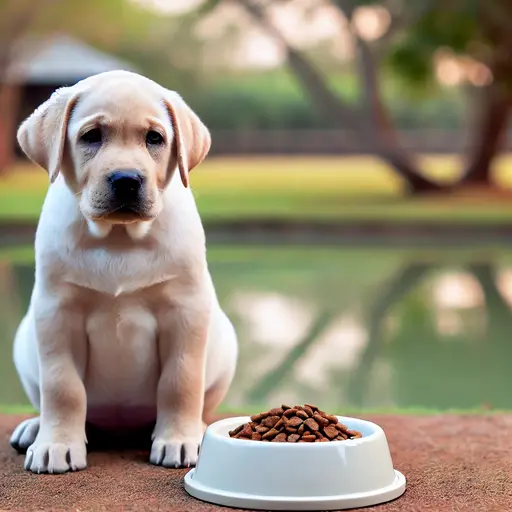What to Do If Your Labrador Puppy Has Diarrhea from Eating Dry Kibble or Drinking Lake Water
One of the most common health issues new Labrador puppy owners face is their pup having diarrhea. This is especially true for puppies around two to three months old, as their digestive systems are still quite fragile and easily affected by diet and environmental factors. For instance, eating dry kibble that hasn’t been soaked or drinking lake water during outdoor activities can upset your Labrador’s stomach, leading to diarrhea. In this article, we’ll discuss the potential causes of diarrhea in Labrador puppies and how to address this situation.

Possible Causes of Diarrhea in Labrador Puppies
Eating Unsoaked Kibble:
A Labrador puppy’s teeth haven’t fully developed, and their digestive system is still weak. Eating hard kibble can lead to indigestion, which may result in diarrhea. Puppies with sensitive stomachs are particularly at risk when introduced to hard-to-digest foods, increasing the likelihood of gastrointestinal discomfort.
Drinking Lake Water:
While lake water may look clean, it often contains various microorganisms and pollutants. Lakes can harbor bacteria (like E. coli), parasites (such as Giardia), and even harmful toxins from blue-green algae. If your Labrador puppy drinks contaminated water, they could develop an intestinal infection, leading to diarrhea.
How to Handle Diarrhea in Labrador Puppies
If your Labrador’s diarrhea is caused by one of these two factors, there’s no need to panic. With the right steps, your puppy can recover quickly. Here are some tips:
1. Immediate Fasting for 4-6 Hours
When your puppy first shows signs of diarrhea, withholding food and water for 4 to 6 hours can be an effective way to give their digestive system a break. This allows the stomach and intestines time to rest and heal without further irritation. If food or water is consumed too soon, it may worsen the symptoms. Monitor your puppy during this fasting period to ensure they aren’t showing signs of severe dehydration or other serious issues.
2. Administering Tetracycline
If you suspect your puppy’s diarrhea is caused by a bacterial infection (such as from drinking lake water), your vet may recommend an antibiotic like tetracycline. This common antibiotic helps combat bacterial infections in the gut and can alleviate diarrhea. However, it’s always best to consult your vet before giving antibiotics to ensure it’s the appropriate treatment.
3. Using Montmorillonite Clay
Montmorillonite clay is a widely used anti-diarrheal that works by absorbing toxins, bacteria, and other harmful substances in the intestines. It also protects the intestinal lining from further irritation. Using montmorillonite clay at the early stages of diarrhea can quickly control symptoms and prevent the condition from worsening.
4. Soaking Kibble
If your puppy’s diarrhea is due to eating unsoaked kibble, consider soaking the kibble in warm water (around 140°F/60°C) before feeding. This makes the food easier to digest and reduces strain on your puppy’s digestive system, preventing further discomfort.
5. Ensure Proper Hydration
Diarrhea causes a loss of fluids, so it’s essential to provide your Labrador with plenty of clean drinking water to prevent dehydration. Offer small amounts of water frequently, ensuring they don’t drink too much too quickly.
When to See a Vet
While tetracycline and montmorillonite clay can help with most cases of diarrhea, you should consult a vet if your Labrador shows any of the following signs:
- Diarrhea lasting more than 24 hours
- Diarrhea accompanied by vomiting, loss of appetite, or lethargy
- Blood in the stool or unusual stool color
Conclusion
Digestive issues are a common part of a Labrador puppy’s development, especially when it comes to improper diet or drinking contaminated water. Tetracycline and montmorillonite clay are effective remedies for many cases of diarrhea, but prevention is key. Make sure your puppy’s food is easy to digest and avoid allowing them to drink from unsafe water sources. Always keep an eye on their health, and if you’re ever unsure, consult a vet for professional advice.
We hope this article helps you take better care of your Labrador puppy!
